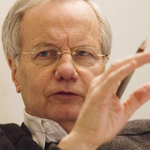The Federal Communications Commission (FCC) will meet tomorrow to vote on proposed rules governing how much control Internet service providers have over which content we see and how quickly we see it. The proposed plan, devised by FCC Chairman Tom Wheeler, is a threat to the concept of Net neutrality — the principal that both governments and Internet service providers should treat all online information equally. Below, writers, policy experts, artists and activists weigh in on why we should all be concerned about keeping the Internet open.
Don’t Let Net Neutrality Become Another Broken Promise
Moyers & Company
Bill Moyers
Moyers & Company Managing Editor
“Barack Obama told us there would be no compromise on Net neutrality. We heard him say it back in 2007, when he first was running for president. …And defenders of Net neutrality believed him, that he would preserve Internet access for all, without selling out to providers like Verizon and Comcast who want to charge higher fees for speedier access – hustling more cash from those who can afford to buy a place at the front of the line.
Michael Winship
Moyers & Company senior writer, Demos senior fellow
“On this issue so important to democracy, they believed he would keep his word, would see to it that when private interests set upon the Internet like sharks to blood in the water, its fate would be in the hands of honest brokers who would listen politely to the pleas of the greedy, and then show them the door.
“Unfortunately, it turned out to be Washington’s infamous revolving door.”
Read more »
Internet Service Providers Charging for Premium Access Hold Us All to Ransom
The Guardian
Cory Doctorow
Journalist, blogger and author
“The Federal Communications Commission, America’s telcoms regulator, has formulated a plan to allow internet service providers (ISPs) to charge companies for the right to “premium” access to its customers. This is the worst internet policy news imaginable. It should strike terror into the heart of anyone who cares about fairness, politics, the widening gap between the rich and the poor, fair trade, entrepreneurship, or innovation. The FCC now stands as the world’s foremost symbol for “regulatory capture,” and its chairman – a former cable executive lobbyist – is the poster child for an unhealthy relationship between industry and its regulators.
“What’s at stake is “network neutrality,” which is the simple principle that your ISP should give you the bits you ask for, as quickly as it can, and not deliberately slow down the data you’re looking for.”
Read more »
Why Independent Artists Should Care About Net Neutrality
Moyers & Company
Astra Taylor
Filmmaker, author and activist
“Artists should quake at the prospect of an Internet that works better for those with deep pockets. A handful of big stars may benefit from this model — for example, directors or actors working on shows produced by NBCUniversal, which recently merged with cable giant Comcast (which hopes to merge with cable giant Time Warner) — but the majority of independents will be worse off.
“The problem, however isn’t just the ISPs — Comcast, Time Warner, Verizon and AT&T — that currently control crucial Internet infrastructure, the onramps to the digital domain. Artists also need to worry about the companies that could conceivably agree to pay for prioritized delivery: that is to say, Google, Amazon, Facebook, Twitter and the like. Artists have long been told that these companies would help liberate them from the grip of the old media system. Unfortunately, the leading tech firms increasingly resemble the legacy media many thought they would inevitably overthrow.”
Read more »
Hell No, We Won’t Go: No Fake Net Neutrality for Racial Justice Advocates
The Huffington Post
Malkia Cyril
Founder and executive director of the Center for Media Justice
“Much of the debate seems predicated on which consumers will be most affected if content providers pass the buck on paying increased costs. So, let’s talk about exactly which consumers stand to lose the most. About 100 million people in the United States live with little-to-no Internet access. Of those, the vast majority are black, Latino or from households with annual incomes under $50,000….
“Low-income households and Internet users of color aren’t the only ones that stand to be hurt by the proposed rules. While the term “content provider” has become synonymous with mid-sized companies like Netflix, there are smaller content providers whose ability to reach audiences will be significantly reduced. Raising economic barriers for these content providers poses an even greater threat to democracy, as the small businesses, non-profits and journalism organizations that can’t afford the content toll being assigned by the FCC are frequently the drivers of racial justice organizing in the United States.”
Read more »
No Fast Lanes for the Few
The Benton Foundation and Common Cause
Michael Copps
Former FCC commissioner
“The first step on the road to an online future that serves us all is for the FCC to get its pending proposals right. Classify broadband for the Title II communications it obviously is and prohibit fast-lane, slow-lane divides created for the commercial enrichment of a few. At the same time, the Commission must step up to the plate and use the authority it has to preempt state laws that prohibit communities and municipalities from building their own broadband infrastructure instead of relying on ISPs that cherry-pick the country when they decide where to build and not build. And let’s go on from there to demand that the FCC finally finds the wisdom and the guts to say “No!” to all these never-ending mergers and acquisitions that are monopolizing the market, disadvantaging consumers, and short-circuiting our democratic discourse.”
Read more »
The FCC’s Flimsy Defense of Fake Net Neutrality
Free Press
Craig Aaron
President and CEO of the Free Press
“To be fair, it appears Wheeler really does think that splitting the Internet into fast and slow lanes is a bad thing. And he’s adamant that he’ll act to stop these bad practices. But under the legal approach he’s clinging to, he can’t actually do it. The court was clear: Unless you reclassify, you can’t stop blocking or discrimination.
If Wheeler doesn’t reclassify and continues down the wrong path, either the rules will be struck down when the FCC acts or, more likely, they’ll never be enforced. And under the convoluted approach he’s proposed, future FCC chairs who think differently than Wheeler does will be under zero obligation to take action.”
Read more »








